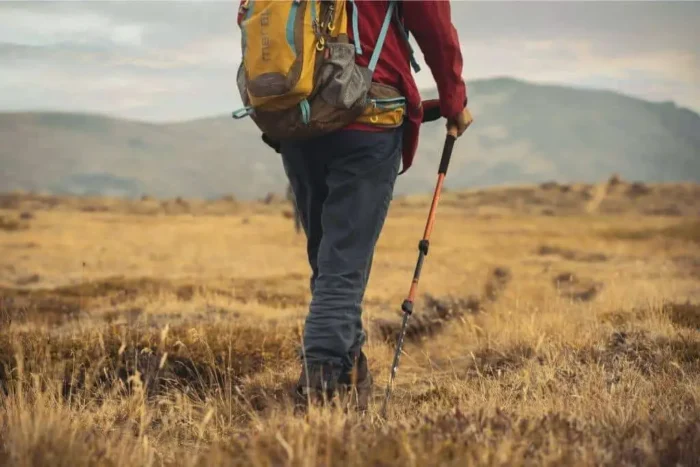Whenever someone mentions the idea of hiking, they may immediately turn to a scenic view or a peaceful walk through nature. While there is undoubtedly something special about taking in the sights and sounds of nature as you explore, there are so many more benefits that come with this activity.
Trekking and hiking offers physical, mental, emotional, and social rewards that people of all ages and levels of fitness can experience. This article will discuss the key benefits of why hiking is more than just a walk in nature; it’s an activity that has the potential to bring lasting positive changes to our lives.
Table of Contents
Physical benefits

The physical benefits of hiking should not be overlooked. Regular hikes can help improve overall fitness, strength, and endurance levels and even help reduce the risk of some chronic illnesses. Hiking also has a low impact on our joints, making it an ideal exercise for people with joint issues. Training for trekking is essential if you intend to go on a more advanced hike.
In addition, studies have shown that hiking can help to reduce stress levels, improve our heart health, and lower blood pressure. It’s also a great way to get some fresh air and sunlight, which helps us to produce vitamin D, essential for bone health.
Mental benefits
Hiking isn’t just about physical fitness; it can also benefit mental health. The peacefulness of nature allows us to step away from the hustle and bustle of everyday life and is known to improve concentration and focus. Research has shown that spending time outside reduces stress levels, while reconnecting with nature helps to boost mental well-being.
Hiking also encourages mindfulness, allowing us to focus on the present moment and be more aware of our surroundings. It can help improve our sense of purpose and identity and increase self-esteem and confidence.
Emotional benefits
One of the most significant emotional benefits of hiking is the sense of accomplishment that comes with reaching a destination or simply climbing a challenging climb. As well as this, being surrounded by nature has been known to increase positive emotions while reducing levels of fear, worry, and anger.
The physical exertion involved in hiking can also impact our emotions; studies have shown that physical activity can release endorphins that help reduce feelings of stress, anxiety, and depression.
Social benefits

Hiking is an excellent way to connect with friends and family; a shared love of the outdoors can bring people closer together and provide a sense of belonging. Planning a hike also allows communication and collaboration and provides opportunities for making new connections.
In addition, hikes also offer group bonding experiences through activities such as setting up camp, preparing meals, navigating trails, or simply exploring together. Taking part in these activities helps to increase levels of trust, respect, and cooperation while reducing feelings of isolation and loneliness.
Environmental benefits
Hiking is also beneficial for the environment. Physically moving through nature encourages us to appreciate and protect our planet while participating in activities such as picking up rubbish or planting trees to help restore damaged areas.
Hiking can also help us become more aware of climate change, with many people noticing changes in their local area that may have gone unnoticed. These experiences can encourage people to participate in conservation efforts and make lifestyle changes that benefit the health of our planet.
What are the disadvantages of hiking?

Like any activity, there are some potential disadvantages to hiking. While the health benefits of getting out in nature are numerous and well documented, it is essential to recognize that there can be risks associated with trekking in the wilderness. Take the necessary precautions and be aware of potential dangers before hiking.
Injury
The most common risk associated with hiking is the possibility of physical injury. Hiking can be physically demanding, and without proper preparation, it can be easy to overexert yourself or develop strains or sprains from overuse. The terrain can also become uneven or slippery, making falls more likely.
It’s essential to wear the proper footwear and clothing to protect your body from the elements and possible hazards. Hiking poles can also be helpful for balance and support on rocky or loose surfaces.
Sun exposure
Another risk associated with hiking is sun exposure. Prolonged exposure to the sun’s UV rays can cause skin damage and increase the risk of developing skin cancer. It’s essential to wear sun protection such as hats, sunscreen, and sunglasses when hiking.
Staying hydrated is also essential to help protect your body from heat. Keeping a water bottle on hand and taking regular breaks in the shade are simple measures that can help reduce the risk of sunburn or dehydration.
Getting lost
Hiking in unfamiliar terrain can also increase the risk of getting lost. It’s essential to do your research before heading out and ensure you are familiar with the area. Noting landmarks along the way can help keep you on track and carry a map and compass or GPS device for extra safety.
It’s also essential to keep your group together and let someone know where you are going and when you will be back. It can help make it easier to locate a lost hiker if needed.
Poor weather
Hiking also risks encountering poor weather conditions such as high winds, heavy rain, or snow. It is essential to pay attention to the forecast and dress appropriately for the conditions to reduce the risk of hypothermia or frostbite.
If possible, avoid hiking during storms, as lightning strikes can be deadly. If you get stuck out in inclement weather, the best strategy is to find shelter and wait for it to pass.

